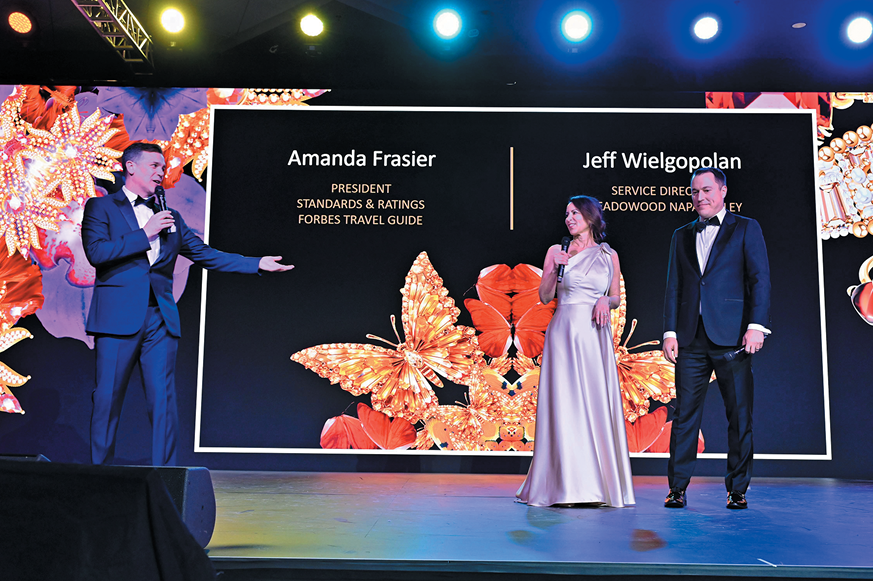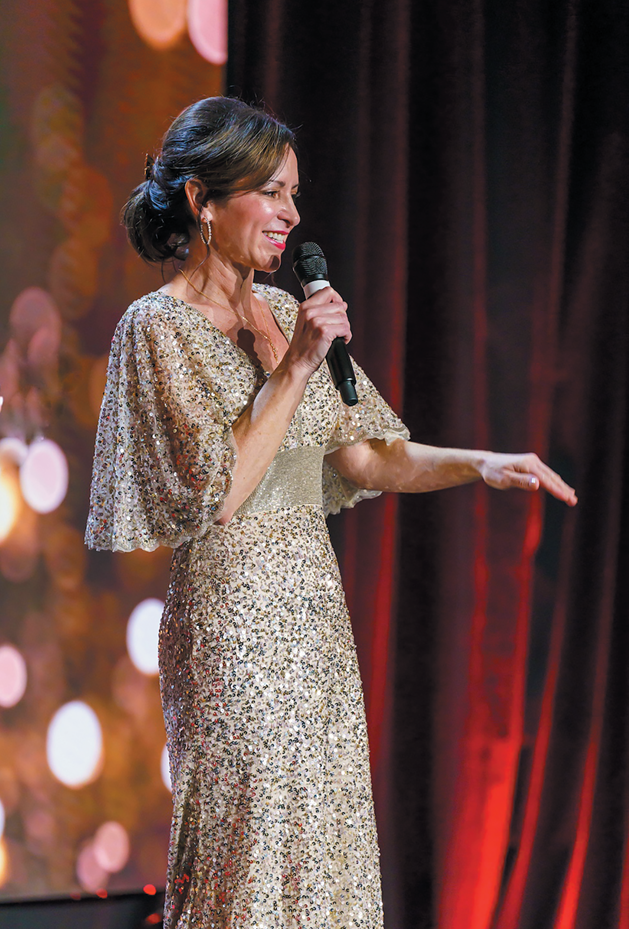- Home
- Media Kit
- MediaJet
- Current Issue
- Past Issues
- Reprints (PDF)
- Photo Specifications (PDF)
- Contact Us
- PRIVACY POLICY
- TERMS OF USE
![]()
ONLINE
![]()
ONLINE

Delivering Authenticity
Editors’ Note
As President of Standards and Ratings, Amanda Frasier oversees all aspects of Forbes Travel Guide’s Star Rating system. Frasier directs the continual refinement of FTG’s service and facility standards and serves as the Chair of the Standards Advisory Committee, whose members provide valuable industry input on trends in global hospitality. She also leads the production of shows and events, including The Summit, the exclusive international showcase for FTG’s Star Award winners and luxury brands to collaborate, network and celebrate. Frasier spearheads the by-invitation-only Brand Officials program, connecting thought leaders in luxury goods and services with the Star-Rated community.
Organization Brief
Forbes Travel Guide (forbestravelguide.com) is the only independent, global rating system for luxury hotels, restaurants, spas, and ocean cruises.

Amanda Frasier takes the stage at The Summit in Las Vegas in 2024
How do you describe Forbes Travel Guide’s mission?
While our method and standards have evolved to stay in touch with current trends, since 1958 the travel guide has stayed true to its mission of providing a tried-and-trusted approach to recommending the very best places to stay, dine and now spa and cruise around the world. We remain independent and unbiased – a rating cannot be bought. We remain committed to delivering authenticity that is deeply guarded and equally respected as a core brand value and hallmark of our Star Ratings.
What have been the keys to Forbes Travel Guide’s impact and leadership in the industry?
When it comes to the Star Ratings, for those that both use our list for travel planning inspiration and earn our rating, it is demonstrating consistency in the method and approach that provides a very important level of trust, which we certainly don’t take for granted. In the same way guests have that unspoken level of confidence when selecting the same hotel to return to based on how certain they are of the service levels they will receive, we take the same pride in the influence we know we have in this space and hold ourselves highly accountable to the same, if not higher, expectations.
Will you provide an overview of your role and areas of focus?
My role, while extremely broad and diverse day-to-day, has two key focuses that I must remain on top of no matter what else is happening. The first is the continual evolution of the standards, ensuring they remain in line with changing consumer perceptions of luxury and service, and concurrently, how that expectation is measured and how what we do is relevant and geographically nuanced as a global system.
In more recent years, I also preside over the production of our annual event, The Summit, where we proudly bring the worlds of travel and luxury together for education, powerful networking, and entertainment-filled evening shows.
Will you discuss Forbes Travel Guide’s ratings process?
The uniqueness of our system is what sets it apart from similar processes. We are not a facility-driven checklist, and our annual guide is not assembled based on a popularity contest. Rather, the process starts with a selection of eligible properties being scheduled – without their knowledge – for an evaluation. The inspector we send – who has received extensive training from FTG – stays at the hotel or cruise ship or experiences the spa or restaurant and is asked to report on whether staff demonstrated the requirements we have. While there are more than 500 standards for the average hotel, we are more focused on the service versus the facility. The facility must be excellent in quality and condition, but we know it is how the staff makes the guest feel that counts for a majority of the final impression the guest will have. As such, we write standards that allow this to be measured and then captured as part of a final score. The guest we send, our inspector, does not specifically determine the final award. This provides a crucial added level of integrity to our process. The inspector provides answers and then that is computed as part of an algorithm that is centered around 30 percent facility, 67 percent service. While we are mostly objective, there is also some necessary and deliberate subjectivity accounted for as part of a Guest Experience score – up to an additional 3 percent – when it comes to assessing things we know are important to a guest, such as value for money and overall impression of the sense of luxury.

Amanda Frasier at The Summit at Resorts World Las Vegas in 2023
Will you highlight Forbes Travel Guide’s focus on the areas of wellness, sustainability and responsible tourism?
Within the evaluation process – across hotels, restaurants, spas, and now cruise ships – we measure wellness not only as a set of defined standards, but also as a classification. This means we now place a heavier weight on the performance based on these requirements, especially in recent years with the impact the pandemic had on guests focusing on their health. Why? Because the average guest is also now more hyper-focused on well-being and in turn, expects this from the travel experience. Guests want to feel well during and after a trip, and in the luxury space, they are expecting this at an especially high level. On behalf of the guest, our standards serve to continue to hold properties accountable for these expectations and assist to continually raise the service bar.
While we don’t have a defined set of sustainability standards for 2025 in the official evaluation, we know how environmentally responsible a hotel operates is a deciding factor when selecting a place to stay. As such, we work in partnership with our Responsible Hospitality Ambassador, Hervé Houdré, to offer properties the chance to become verified on our own proprietary Responsible Hospitality platform and display that verification as a mark of excellence in this area. It lives alongside the Star Rating to help better guide travel decisions.
What was the vision for creating The Summit annual luxury travel conference where travel and luxury meet, and how has this event evolved?
For many years, we have celebrated the tremendous achievements of all our Star Award winners annually, and the event has always been a wonderful moment in the year to gather the industry together. However, as we have grown and evolved, and as luxury and the travel industry have grown and continue to evolve at a rapid pace, we always wanted to bring a deeper level of development programming to the show. We know making that commitment to travel and being away from your business for a number of days is a significant investment of one’s time. So, we wanted to ensure that when you attend The Summit, we provide a program rich with varied educational content, new data and trends along with incredible networking experiences that not only serve to make you a better business and leader, but also enrich your personal growth, too. We also bring up to 100 of the world’s finest luxury travel professionals to The Summit, using our trusted platform of influence to connect travel buyers to our collection of world-class properties. And of course, we put on spectacular evening events with bespoke performances to celebrate the industry. For 2025, our event is being held in Monaco, and we have some very special surprises planned.
Do you feel that there are strong opportunities for women to grow and lead in the industry?
Yes, I do. And we are seeing more and more leadership positions filled by women in recent years. Significant C-suite and CEO roles are being filled by extremely talented and influential female leaders as a complement to incredible male leadership. I think it’s easy to say the industry needs to do more to ensure women can step into these roles, and this is true of any industry to be conscious of, especially when shifting work and time away from home is part of the role, as the travel business is notoriously known for. But I also think the changes we now see reflect society evolving and the way we live our day-to-day lives is changing. This shift makes stepping into roles that may have once been considered male-dominated positions more approachable for women to fill.
If we even look at the way it has become more and more commonplace to combine personal and business trips – even at our own Summit, we have made it easier than ever before to travel with a guest, and we actively encourage our invitees to blend it into a personal trip. And we can’t overlook the fact we are all living longer, healthier lives, and this also provides new opportunities, especially when your family and children are older, and you are not quite ready to retire. A balance of work and personal life will certainly continue to be exactly that, a balancing act, but as society evolves, the more balanced career opportunities will also become.
You have been with Forbes Travel Guide for almost 20 years. What has made the experience so special for you?
Without a doubt the people. We have a fairly close group of employees. Some of us have worked together for upwards of 15 years, so we know each other pretty well, too. I also think the fact we are mostly all remote all over the world, connecting when we are passing through the same city or at an event, makes you appreciate each other a little bit more.
Of course, for those of us in a role that requires travel – which is a majority of the team – the chance to visit places and properties you may never have otherwise had the chance to do so makes for a treasured collection of experiences over the years that I never take for granted. While I don’t travel as much as I used to, when your work provides you the opportunity to get on a plane and fly to a new country or city, this is certainly a privilege, and it gives you an entirely different perspective on life.
What advice do you offer to young people interested in building a career in the hospitality industry?
Diversify your experience and do as much as you can across multiple disciplines in the industry. Whether you prefer one area of the business over another, force yourself to do the things that may not seem as appealing or important to you, so you can get the hands-on practical exposure. It will serve you more than you realize in the longer term, it will open more doors when you least expect it, and ultimately it will make you a better leader when you get to that point in your career – even if you are terrible at it. I was a terrible housekeeper, but I did it, and it taught me admiration and respect for one of the lesser-seen, but most hard-working departments, in any hotel.![]()